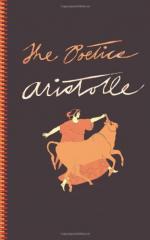
|
| Name: _________________________ | Period: ___________________ |
This quiz consists of 5 multiple choice and 5 short answer questions through Section II.
Multiple Choice Questions
1. What are/is the name(s) of the part(s) that Aristotle gives to the plot of a tragedy?
(a) Good, bad and worse.
(b) The complication and unraveling.
(c) The beginning, middle, end, and whole.
(d) Whole.
2. Aristotle asserts that the main character of a tragedy must have what?
(a) Weakness.
(b) A lot of money.
(c) Complete confidence.
(d) A tragic past.
3. Like any art, poetry is defined by Aristotle as what?
(a) A funny story.
(b) A kind of imitation.
(c) A theatrical play.
(d) A rhyme with more than four sentences.
4. What type of action does Aristotle say occurs without "Recognition" or "Reversal of Situation"?
(a) Incongruent.
(b) Good.
(c) Simple.
(d) Sad.
5. In a tragedy, which of the following would Aristotle consider to be false?
(a) The action is more tragic when a person who is aware of the circumstances does not perform the action.
(b) The action may be done unknowingly.
(c) The action may be done knowingly.
(d) An action can either be done or not done.
Short Answer Questions
1. Per Aristotle, the unity of plot is what to the unity of a character's actions?
2. Men are drawn to write poetry for several reasons. Which of the following is NOT one of the reasons Aristotle provides?
3. Aristotle says that at most, episodic plots involve what?
4. Aristotle says what type of poetry imitates the "lower" types of men?
5. Why does Aristotle believe that a failed action by a person who is aware of the circumstances is considered to be of a certain quality?
|
This section contains 319 words (approx. 2 pages at 300 words per page) |

|




